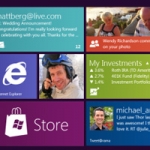Directive Blogs
Windows 8 - An OS for Every Occasion
Windows 8? Doesn't it feel like Windows 7 just came out? Windows 7 isn't being replaced anytime soon; the latest operating system by Microsoft hasn't even been out for two years, but that doesn't mean Microsoft isn't cooking up their next incarnation. Microsoft has always kept small businesses in mind as well as the residential consumer, so will Windows 8 stick with the same trend?
After Microsoft demoed their latest Windows platform, the industry has been asking, "Can they really pull this off?" If you haven't seen or read anything about their demo, then you probably don't know what Microsoft is trying to do with Windows 8. A better question could be: what aren't they trying to do with it? The biggest draw (or fault, depending on your stance) to Windows 8 is the complete UI redefinition. This new interface has been described as the biggest change since Windows 95. At first glance, the new interface looks like a large Windows Phone 7. This is due largely in part to Microsoft's approach to their UI design. They are trying to streamline the design so that it works and displays well on all forms of computing. This means that your Windows 8 PC, tablet, phone, etc. will all have very similar, if not identical, displays and functionality. It's easy to see where opinions on this new interface would differ. Some applaud this approach by stating it is a step forward and is keeping with the ongoing trend of evolving touch technology. Others feel that designing a desktop UI with touch in mind is going to cripple sales of the new platform. It has also been said that this new platform might be too complex for use on all Windows capable devices. Apple's iOS and Mac OS work because each one has trade-offs. They are not trying to do everything with one solid system. For small businesses, upgrading to a new operating system can require some internal training for staff who have for years been accustomed to the old ways of doing things. Fortunately so far Microsoft has kept a lot of the basics in tact over the years, but jumping to a whole new interface may be difficult for some users to switch to. On the other hand, the new interface should be more efficient and users who pick it up quickly won't miss a beat. This could be a big jump for businesses who want to incorporate mobile computing into their day to day, with a similar system running on all devices, the transition would be much more seamless from say a desktop to a tablet or mobile phone. So, will Microsoft be able to streamline their new OS for all Windows mediums? Right now, it is too early to tell. The new platform already looks great for tablets and smartphones, but those technologies are meant to be accessed through touch. The real challenge will be whether or not desktops and laptops, mediums familiar with the mouse and keyboard, can utilize this new interface effectively. Microsoft is shooting for a Q3 2012 release for Windows 8 so they have plenty of time to polish their craft and even win over some of the naysayers. In the mean time, Windows 7 is not going anywhere, and will be supported long after the release of 8. One thing is for sure, we're going to be hearing a lot about Windows 8 over the next year. Got questions about upgrading your current IT infrastructure? Give us a call at 607.433.2200. If you are running older operating systems like Windows 2000, XP, or Vista, there's no better time to upgrade to Windows 7. DirectiveSHORT can help get upgraded so your business can run smoothly and securely.


